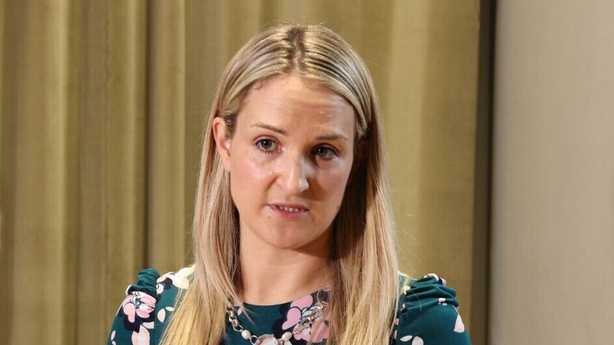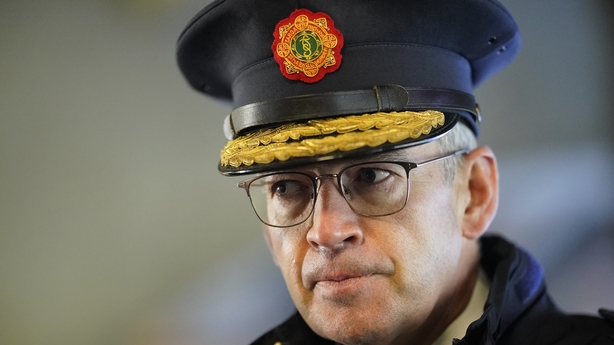The Minister for Justice has said the Government is working on new legislation to ensure gardaí have the powers they need to investigate serious crime.
She was speaking at the Association of Garda Sergeants and Inspectors (AGSI) conference in Killarney about the European Court of Justice ruling last week in the Graham Dwyer case that found the retention of data had breached EU legislation.
Helen McEntee said she did not want the gardaí operating with their hands tied behind their back and while it was important that safeguards were in place, people's right to privacy was not as important as detecting crime.
Meanwhile, the Association of Garda Sergeants and Inspectors has strongly criticised the level of training for gardaí dealing with domestic violence cases.
The association, which represents middle-ranking gardaí, has described the current online training system as totally unsuitable and not fit for purpose, and has called for a return to in-person victim-centred training as a matter of urgency.
The Minister for Justice has said garda training is currently being reviewed, and two new modules on sexual offences and victim engagement are to be delivered this year.
Ms McEntee was to also tell the AGSI conference that the use of body-worn cameras is due to be piloted in the next year. An Garda Síochána has in recent years increased its focus on domestic and sexual violence and has established new specialist units to investigate these crimes.
We need your consent to load this rte-player contentWe use rte-player to manage extra content that can set cookies on your device and collect data about your activity. Please review their details and accept them to load the content.Manage Preferences
An interim report for the Policing Authority on the cancellation of 999 calls - 3,000 of which related to domestic violence - found that some victims may have experienced harm, the extent of which was unknown.

The report by the former head of Police Scotland, Derek Penman, also found that garda supervision, quality assurance checks and management procedures were either "not followed", "not effective" or "weak".
Garda sergeants and inspectors also say there is a major problem with how gardaí are being trained to investigate these crimes.
The AGSI said training is being carried out online and there has been no in-person or victim-centred courses for years.
While the association said it accepts that Covid-19 has had an impact on training, it insisted that organisations dealing with victims such as Women's Aid and the Rape Crisis Centre need to be able to address gardaí in person to inform their investigative methods.
General Secretary Antoinette Cunningham has described the current level of training as wholly and totally unsuitable, inappropriate and not fit for purpose given the gravity and seriousness at which this crime should be dealt with.
She also criticised the fact that no provision has been made for the introduction of in-person training courses and said they have made the AGSI's position very clear to the Garda Commissioner and garda management several times over the last few months, but have not received a response.
The AGSI is now calling for a return to in-person victim-centred domestic violence training as a matter of urgency.

Ms McEntee will tell the conference that Garda Commissioner Drew Harris is reviewing plans for learning and development including training for the Divisional Protective Services Units - the specialised units which deal with domestic, sexual and gender-based violence.
Ms McEntee also said two revised training modules dealing with Sexual Crime Investigation and Victims Engagement will be rolled out and delivered in Templemore, while further modules on Domestic Abuse Intervention and Investigation, Sex Offender Management and Online Child Exploitation will also be rolled out during the year.
The garda associations have long been calling for the introduction of body-worn cameras, and Ms McEntee said these will be piloted in some garda divisions in the next 12 months with their full roll-out beginning in 2023.
The Digital Recordings Bill, which provides for An Garda Síochána's use of body-worn cameras, drones, CCTV and Automatic Number Plate Recognition is to be published next month, and Ms McEntee said she intends to have the bill enacted this year.
Delegates at the annual conference have also called for a return to classroom training for complex crime such as money laundering and online fraud.
They are seeking a review of the current ranks within An Garda Síochána, to assess international best practice and examine the need for a new rank, that of Chief Inspector, considering the increased responsibilities that have arisen from the garda's new Operating Model structure.
Nineteen motions on topics as varied as policing, promotions, welfare and workforce modernisation are to be discussed over the next three days, including one from delegates in Carlow/Kilkenny asking conference to direct "the National Executive to change the current A5 diary to an A4 size".





